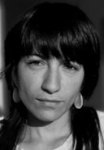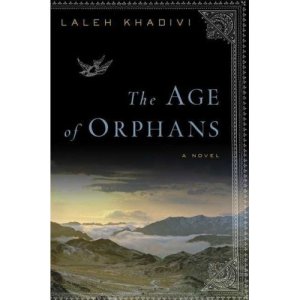
Laleh Khadivi
New novel explores issues of Kurdish identity and forced betrayal. Laleh Khadivi is the recipient of the Whiting Writers’ award for this book, her debut novel. It is the first of a trilogy which explores the lives of three generations of Kurdish men and their relationships with identity and the state. Khadivi is working on the second novel of the trilogy, The Walking.
Article from today’s Atlanta Journal-Constitution about Khadivi and her work.
Severed roots are haunting
By Catherine Fox
The sunny carriage house in Inman Park is yet another temporary home for Laleh Khadivi. She has lived in more than a dozen places since her family left Iran at the start of the Islamic revolution in 1979.
Now at the tail end of a two-year creative writing fellowship at Emory University, she writes, longhand, in a loft space surrounded by material memories of other places.
Books accumulated over her 31 years line the wall behind her. A sculptural specimen of California driftwood — bleached white, hard-to-pack — crowns a bookshelf in the corner. The smooth stones she collects wherever she goes cluster around the tub.
“I keep coming back to rocks and stones, mountain and land,” Khadivi said. “It’s my own yearning for belonging, a connection.”
Uprootedness is the theme of her first novel, “The Age of Orphans,” which won a Whiting Foundation Writers’ Award last year.
The protagonist, a Kurdish boy, is a casualty of Iran’s tumultuous transition from tribal rule to nationhood.
Torn from home and family and conscripted into the shah’s army, he is renamed Reza Khourdi and indoctrinated as a “modern” Iranian. Though he renounces his tribal allegiance, his new identity is never more than a mask. In the end, he is a broken man who belongs nowhere.
Unflinchingly, Khadivi limns the emotional and physical brutality of the tribal-suppression campaign and Reza’s splintering psyche in language both fierce and poetic.
“The mythic language comes from the idea that Kurds … have been telling their own stories for a really long time,” she said, sipping tea at her dining room table. “I wanted to slip very elegantly into that stream of storytelling and add this other chapter of what happens when Iran becomes a nation.”
“Orphans” is the first book of a three-generation trilogy. Though derived from her family history, the arc of the saga she is planning — political upheaval, migration, assimilation — will be familiar to “orphans” everywhere.
The road to ‘Orphans’
Khadivi took a roundabout path to her present occupation. She went to New York after college and spent five years making social-issue documentary films before deciding to become a doctor in 2002. Moving to California for medical school, she decided to map her trip so she could visit aunts and uncles in Chicago, Texas and Los Angeles.
At the time, her motive was personal: a longing to learn more about the Kurdish side of her family. But when Khadivi quit medical school after one semester to take up the writing life, the stories she had recorded would help her summon the world that created and ruined Reza.
Khadivi needed no help, however, in imagining her protagonist’s sense of dislocation. A childhood spent hopscotching across continents, countries and American states left her a perennial outsider. Spending her teens in Atlanta, a city steeped in its history, magnified those feelings. She remembers staring at the Confederate leaders chiseled into Stone Mountain, thinking: “These are not my heroes. I don’t belong here.”
Khadivi, who graduated from the Atlanta International School in 1995, marveled at the multigenerational burial plots in Oakland Cemetery. “These were people who didn’t go anywhere! They lived and died in the same place.”
Soon Khadivi will leave Atlanta for the second time. She will return to California, which, she’s decided, is home. The $50,000 Whiting Award will allow her to write full time and, hopefully, complete her second book. Then it will be time to find a teaching position and, perhaps, move again.

Always great to see Kurds doing well abroad. Hope her work gets translated into several different languages, including Kurdish.
Hi, thank you for the review. I’m Laleh’s editor at Bloomsbury and was wondering if we might correspond or speak about any ideas you might have about how to get this important books futher attention. I’d be very grateful for the opportuity to talk.
Please let me know, best, Anton Mueller
Thanks you for your email. I have sent your request to a friend who I believe can be of assistance. I agree that her book needs further attention!
best,
KB
Hello, Anton Mueller,
This week I’m leading a 40-person discussion group featuring The Age of Orphans and would appreciate hearing your thoughts about why this exceptionally powerful, important, and beautifully written book has received so little attention to date from reviewers. What sort of feedback have you heard, if any, from the press? I can’t account for it given the book’s merit and timeliness.
Thank you.
Julia Kelly Smith
We are reading her book in our Contemporary World Literature book club in Vancouver, Canada. Has this book been translated to Persian or Kurdish? Or any future prospect for that? If there are ideas about promoting her book here in BC, Canada, please let me know. Is there a chance that we Skype the author?
All great questions! And I don’t know the answers. You’ll have to contact her publisher at Bloomsbury. Let us know what you find out about the translations.